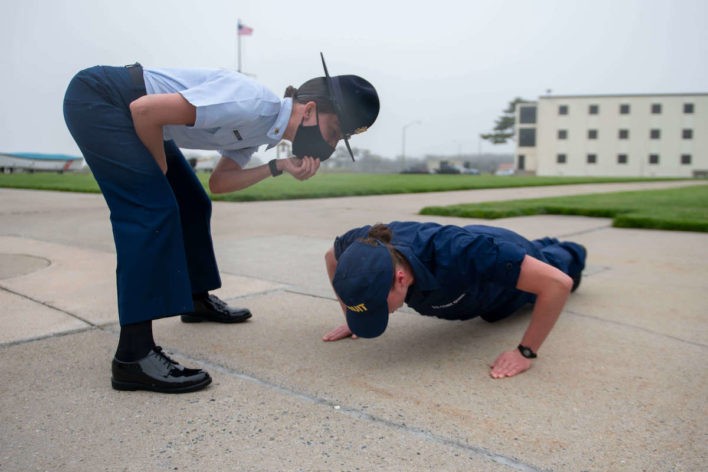Military Myths: Prepping for Boot Camp

Prepping for Boot Camp
Military boot camp is like nothing you have ever experienced. However, the rigid routine and absolute control over every aspect of your life are several times worse than normal military duty, and that is by design. It’s the job of the Training Instructor (TI), Drill Instructor (DI) and Drill Sergeant (DS) to either adjust your attitude to a military way of thinking (self-discipline, sacrifice, loyalty, and obedience) or to drum you out before the military spends too much money on your training. Boot camp is designed to be highly intense and challenging. It is important to note that not all boot camps are the same. Each branch has a different level of uncomfortableness and rigidity associated with their respective role in our nation’s defense.
As it is with most elements of Military Service, there are myths that surround boot camp and the ability to discern the facts from the myths is paramount when preparing for arrival at the initial entry site. Most of the time, there are two ways an individual gets exposed to these myths. The first is at the reception site for initial entries. All individuals arrive at a reception type unit before heading “down range” to the boot camp site. There uncertainty and doubt create these “monstrous” myths that tend to add to the stress of being in that environment. The second major cause of myths, in a humorous way, is Veterans. Veterans always like to say, “it was harder in my day” which could be true to some degree, however a lot of myths are created based on this mantra alone. It is true that boot camp has changed over the years, however the basic elements of the training remain the same. When I joined the military in August of 1999, I had absolutely no idea what boot camp consisted of and had a very rude awakening when I arrived at Ft. Benning, Georgia in January, for Army Basic Training. Only information I had to go from was what I was told at reception by other recruits and what previous veterans told me prior to my arrival at Ft. Benning. Below are three of the myths that I encountered before I arrived at boot camp.
MYTH #1:
The military will get me into shape, I do not need to be in shape when I arrive.
Answer: False. Chances are that your current workout does not include exercises you will do at boot camp. When I joined, I was a great runner, however in a painful way, I quickly discovered that I was not particularly good at any exercise that concerned the upper body. At boot camp, you will use muscles you did not know existed and you will use them constantly. Depending on your service boot camp, the training programs have an obstacle course, rope climb, swimming, ruck marches, and use the push-up as a punishment exercise. So, prepare yourself properly for your service’s standards at least 4-6 months prior to departing for the military. Most reception sites have a Physical Fitness Test (PFT) that the initial trainee needs to pass to start Boot camp and failure to pass the PFT usually results in the recruit being sent to some type of fitness training unit until the recruit passes the test.
MYTH #2:
All financial liability and debt stops when you are at boot camp.
Answer: False. A pitfall for a lot of recruits is financial management. Recruits with pre-existing debt tend to let it fester and eventually grow into a much larger amount. Ignoring pre-existing debt can ruin an individual’s credit, reputation and destroy their chances of getting a high-level security clearance that could be needed for their pending military assignment. Many creditors will suspend your service or debt during boot camp, if the proper documentation is provided, however it is important to speak to them at least two months prior to leaving for boot camp. Make sure you stay on solid footing financially by planning ahead and using the resources available to service members.
MYTH #3:
Your fellow enlistees are there because they were “court-ordered.”
Answer: False. No matter what era a person attended boot camp, there is always someone who states that they had to join the military because the “judge told them to.” These tough-guy types are often the first ones to be sent home for failing to conform to military life. Even though establishing street cred is crucial to surviving boot camp (it is not), the actual reality of the situation is far less sexy than a court ordered sentence to military service. Although a criminal record is not automatically disqualifying, there are some situations where the armed services will not grant waivers. If a person has a felony conviction as an adult, or a juvenile felony conviction that involved violence, chances of a waiver to enlist as slim. Likewise, for offenses involving the sale of illegal drugs, and most sex offenses are disqualifying. Anyone convicted of a domestic violence misdemeanor is barred from carrying a firearm, which would disqualify the person from serving in the military. The Military Entrance Processing Station, better known as MEPS, will conduct a thorough background check on each enlistee prior to them join the Armed Forces.
There are several other myths that a recruit will encounter, however debunking these three will help ease the stress that will occur upon initial entry into our nation’s Armed Forces. For more information on each branch’s boot camp, follow this link.
Military Myths Series:
- Military Myths: Joining the Military
- Military Myths: Prepping for Boot Camp
- Military Myths About Boot Camp
- Myths About Military Spouses
- Myths and Tips for Male Military Spouses
RELATED:
About the author
Julie Provost is a freelance writer, and blogger. She lives in Tennessee with her National Guard husband and three boys.


